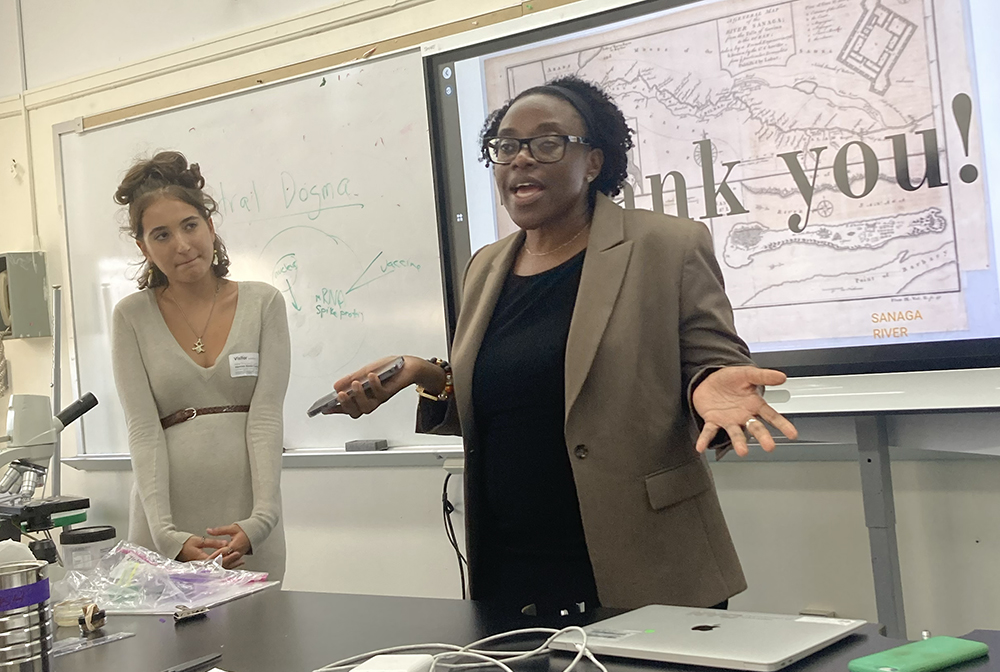Summit on Mobility and Immobility: Student Leaders Connect Globally, Share Projects on Displacement and Advocacy
Students with the Hubs for Connected Learning in Kakuma Refugee Camp in Kenya in a workshop during the Summit on Mobility and Immobility. Photo courtesty of Hubs.
Focus on Student Leadership
Rebecca Granato, Director of the Hubs, says the summit succeeded in the challenging task of linking up student leaders from across the network with their Hubs-related peers so they could share important civic engagement projects and scholarly work directly. “The focus on student leadership and the presentation of their civic engagement projects is key to OSUN/Hubs’ work advocating for change. It also presents OSUN programs as replicable models across the globe,” adds Granato.
Students and faculty from Bard College Annandale, Bard College Berlin, European Humanities University, American University of Bulgaria, University of Witwatersrand, SOAS, Cambridge University, Al-Quds Bard, American University of Central Asia, Parami University, Sciences Po, Universidad de los Andes, BRAC University, and the American University of Beirut presented and participated. Outside partners who joined the events included the UNHCR, InZone (University of Geneva), Tertiary Refugee Students Network, Opening Universities for Refugees, and World University Service of Canada.

BHSEC Manhattan faculty member Ursula Embola (right) and student Laura-Albane Peyronnet present research at BHSEC Bronx during the Summit on Mobility and Immobility. Photo courtesy of BHSEC.
Alamin Jibirin Tutu, a Hubs student based in Kakuma who participated in the week’s events, says he was “pleasantly surprised by the power of student advocacy discussed at the summit. Learning about successful student-led initiatives from around the world was inspiring and showed the impact I can make.”
Jibirin says the blended summit allowed him to see the common goals that students in different countries share and provided a “broader understanding of global perspectives on student advocacy, leadership, and civic engagement. It allowed me to gather and bring back valuable insights and strategies to Kakuma, enhancing my ability to make a meaningful impact in my local community.”
A Range of Migrant Experiences
Panel discussions focused on issues such as student advocacy, climate change, refugee capacity building, and the politics of displacement. The summit’s student-moderated keynote panel explored a range of migrant experiences, particularly as they relate to education.
Jazmin Puicon, Assistant Professor of History at Bard High School Early College Newark, discussed her efforts to create a digital archive of the oral histories of peasant women, mainly Afro-Colombian, who embraced community organizing and education in the first half of the 1900s to stave off the large scale agricultural firms encroaching on farming families in the Cauca River Valley in Colombia. Eventually, violent attacks displaced these communities, forcing them to migrate to the city of Cali, where their organizing activities became the backbone of popular democracy efforts that challenged the political status quo and voiced the concerns of the city’s most vulnerable citizens.
Trailer for "The Bridge," a docudrama written and produced by a team of interpreters at Kakuma Refugee Camp in Kenya.
Organizers also screened “The Bridge,” a docudrama film aiming to raise awareness about camp-based interpreters and to advocate for changes in their working conditions within humanitarian agencies. The 30-minute film is based on more than a year of collaborative research, initiated by Laura Kunreuther, Associate Professor of Anthropology at Bard College Annandale, with and about interpreters in Kakuma Refugee Camp. It was written and produced by a group of Kakuma interpreters, who became OSUN Hubs research fellows.
The film depicts a group of interpreters and translators (played by some of the filmmakers and actors from the camp) who work for a fictive humanitarian agency in the camp who struggle with delayed payments, lack of training, and retriggered traumas as they do their best to assist fellow refugees. After advocating for changes in their work conditions, several of the interpreters lose their much-needed jobs.
During the follow-up discussion moderated by Hubs student Christian Baobab with filmmakers Kamoso Jean Bertrand, Mulki Mohamed Ali, and Adam Mohamed Bashar, a student from BRAC University wrote in the group chat that “This story is like the Rohingya.” The comment, echoed by others, referenced the Muslim ethnic minority group from Myanmar now living as refugees under harsh conditions in Bangladesh. “Most refugees are experiencing something similar, including trauma,” another participant added.
The panelists explained that the film was in post-production but would be finished in time to be screened at the UN Global Refugee Forum (GRF) in December in Geneva. They hope to raise funds to support advocacy for all types of incentive workers, who share similar challenges, and are seeking connections with activists who might assist. They have started their own community based organization called PhotoFilms4Change, which aims to produce more research-based films.
The summit is key to supporting OSUN’s role in the UN GRF, where OSUN will convene major panels on the refugee education landscape. “The GRF presents an opportunity to showcase student leaders advocating for people who are displaced and to highlight OSUN's commitment to achieving the global goal of bringing 15% of displaced youth into higher education by 2030,” says Granato.
Hubs student Nyariel Udier, who attended the week’s events, says “As a resident and student in Kakuma, the blended summit experience…allowed me to share my unique perspective from Kakuma and shed light on the challenges and opportunities we face in refugee education. Additionally, I gained valuable insights into the global landscape of efforts aimed at improving refugee education,” she says.
Post Date: 10-10-2023